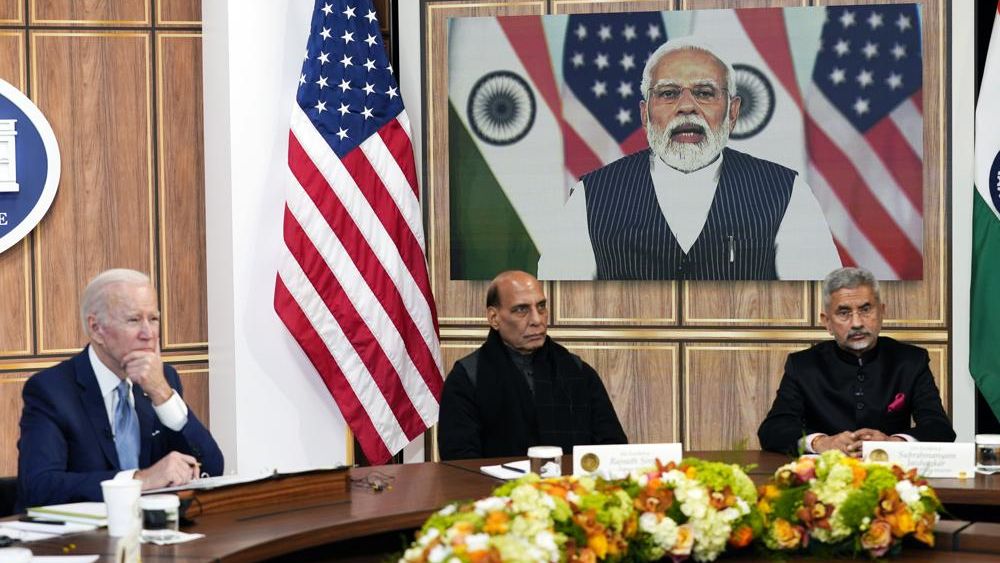President Joe Biden held a virtual meeting with Indian Prime Minister Narendra Modi on Monday as he presses world leaders to take a hard line against Russia’s invasion of Ukraine.
The two leaders pledged to continue their "close consultation" on how to manage the impact of Russia's invasion of Ukraine and both came together to condemn the atrocities committed in Ukraine, including the massacre in Bucha and the recent attack on a train station in eastern Ukraine.
"I want to welcome India's humanitarian support for the people Ukraine are suffering a horrific assault, including a tragic shelling and a train station last week that killed dozens of innocent children and women and civilians attempting to flee the violence," Biden said. "The United States and India are going to continue our close consultation on how to manage the destabilizing effects of this Russian war, and I'm looking forward to our discussions today."
Modi, who said that an Indian student was killed in Ukraine, called the conflict between the two countries "very worrying" and appealed for peace.
"During this entire process I spoke several times on the phone to the presidents of both Ukraine and Russia," Modi said through a translator. "I not only appeal for peace, but also suggested that there be direct talks between President [Vladimir] Putin and the president of Ukraine. We had extensive discussions on Ukraine in our parliament as well."
"Recently, the news about the killings of innocent civilians in the Bucha city was very worried," Modi added. "We instantly condemn the killings and have called for an independent inquiry. We hope that the ongoing discussions between Russia and Ukraine will lead to peace."
"We have also emphasized the importance of the security of civilians in Ukraine and the unhindered supply of humanitarian assistance to them," Modi continued, referencing medicine and other relief materials India has sent to Ukraine and its neighboring countries, with more to come soon.
The two leaders also praised the strong relationship between their countries.
"We take the same concerns about the global challenges we faced with COVID-19, advancing health security, tracking the climate crisis and we share a strong and growing major defense partnership," Biden said. "The root of our partnership is a deep connection between our people, ties of family and friendship and of shared value."
"Our continued consultation and dialogue are key to ensuring the U.S.-India relationship continues to grow deeper and stronger, delivering our people and our global good," Biden added.
"India is celebrating 75 years of its independence and we are also celebrating the 75th anniversary of our diplomatic relations as well," Modi said. "I am confident that our friendship with America will be an integral part of India's development journey over the next 25 years."
India’s neutral stance in the war has raised concerns in Washington and earned praise from Russian Foreign Minister Sergey Lavrov, who lauded India this month for judging “the situation in its entirety, not just in a one-sided way.”
Most recently, India was one of 58 countries that abstained when the U.N. General Assembly voted last week to suspend Russia from its seat on the Human Rights Council over allegations that Russian soldiers committed war crimes in Ukraine.
In the virtual meeting, Biden was set to discuss "the consequences of Russia’s brutal war against Ukraine and mitigating its destabilizing impact on global food supply and commodity markets,” White House press secretary Jen Psaki said in a statement Sunday.
"President Biden and Prime Minister Modi will discuss cooperation on a range of issues including ending the COVID-19 pandemic, countering the climate crisis, strengthening the global economy, and upholding a free, open, rules-based international order to bolster security, democracy, and prosperity in the Indo-Pacific," Psaki added.
India continues to purchase Russian energy supplies, despite pressure from Western countries to avoid buying Russian oil and gas. The U.S. has also considered sanctions on India for its recent purchase of advanced Russian air defense systems. Last month, the state-run Indian Oil Corp. bought 3 million barrels of crude from Russia to secure its needs, resisting entreaties from the West to avoid such purchases.
An administration official told reporters after the call that Biden was "candid" about India's neutrality in the conflict but did not make a specific energy ask of Modi. The official described the meeting between the two leaders as "warm."
"There was no concrete ask and concrete answer, but the leaders were able to step back and have a pretty detailed and candid exchange of views," the official said, noting that the U.S. "hasn't asked India to do anything in particular."
"Other countries have to make their own choices," the official added. "That said, we don't think India should accelerate or increase imports of Russian energy."
Biden instead sought to highlight where India can "mitigate the destabilizing impacts of Putin's war," the official said, such as food supplies. "There was discussion about what more India might be able to do."
In an official readout of the call from the White House, the two leaders "discussed the destabilizing impacts of Russia’s war against Ukraine, with a particular focus on global food supply."
India isn’t alone in buying Russian energy, however; Several European allies such as Germany have continued to do so, despite public pressure to end these contracts.
Indian media reports said Russia was offering a discount on oil purchases of 20% below global benchmark prices.



